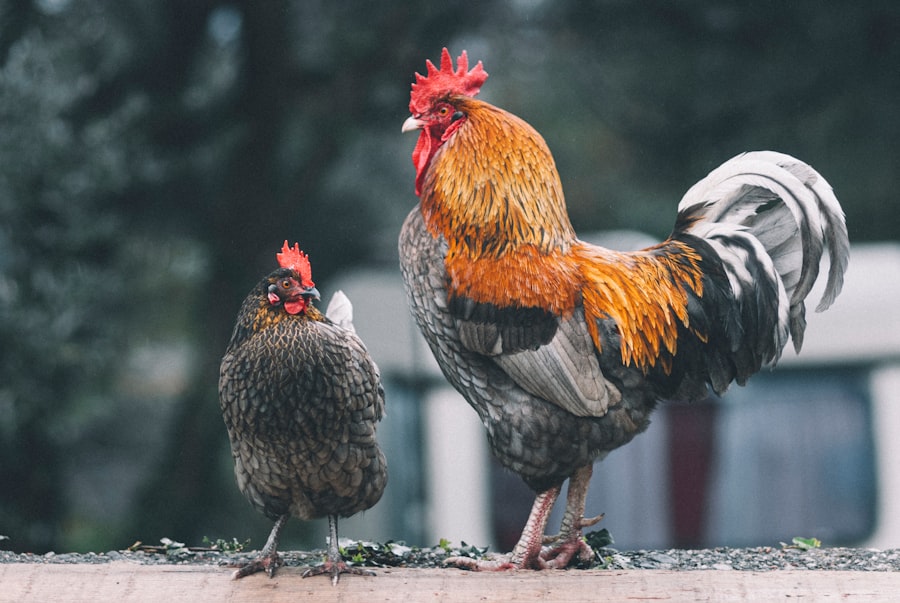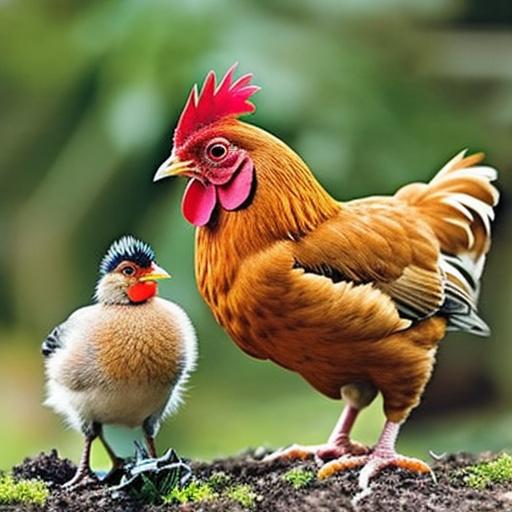Keeping chickens in your garden is a rewarding and fulfilling experience that more and more people are embracing. Not only do chickens provide fresh eggs, but they also offer natural pest control and can even be great companions. Having chickens in your backyard allows you to have a direct connection with your food source and promotes sustainable living. In this article, we will explore the benefits of keeping chickens in your garden, discuss the different breeds to choose from, provide tips on building a chicken coop, and share ideas for maintaining a clean and healthy environment for your feathered friends.
Key Takeaways
- Keeping chickens in your garden can provide many benefits, including fresh eggs and meat, natural pest control, and fertilizer for your garden.
- When choosing a chicken breed for your garden, consider factors such as egg-laying ability, temperament, and climate adaptability.
- Some of the best egg-laying chickens for your garden include Leghorns, Rhode Island Reds, and Australorps.
- If you’re interested in raising meat chickens, consider breeds such as Cornish Cross or Freedom Rangers.
- Dual-purpose chickens, such as Plymouth Rocks or Wyandottes, can provide both eggs and meat for your garden.
Benefits of Keeping Chickens in Your Garden
One of the main benefits of keeping chickens in your garden is the abundance of fresh eggs they provide. There is nothing quite like collecting eggs from your own backyard and enjoying them for breakfast. Not only are homegrown eggs delicious, but they are also healthier than store-bought eggs. Chickens that are allowed to roam freely in a garden have access to a variety of plants, insects, and worms, resulting in eggs that are higher in omega-3 fatty acids and lower in cholesterol.
Another benefit of having chickens in your garden is their natural pest control abilities. Chickens love to eat insects, slugs, snails, and other pests that can damage your plants. By allowing chickens to roam freely in your garden, you can reduce the need for chemical pesticides and promote a healthier ecosystem.
In addition to fresh eggs and natural pest control, chickens can also be great companions. They have unique personalities and can provide entertainment and joy as you watch them scratch around the garden or interact with each other. Many people find that spending time with their chickens is therapeutic and helps them relax and unwind after a long day.
Choosing the Right Chicken Breed for Your Garden
When it comes to choosing the right chicken breed for your garden, it’s important to consider factors such as temperament, egg-laying abilities, and space requirements. Some breeds are more docile and friendly, while others may be more flighty or aggressive. It’s important to choose a breed that suits your lifestyle and preferences.
There are many different chicken breeds to choose from, each with its own unique characteristics. For example, Rhode Island Reds are known for their excellent egg-laying abilities and friendly temperament. They are a popular choice for backyard chicken keepers because they are low-maintenance and produce large brown eggs.
If you’re looking for a breed that is known for its beauty and unique feather patterns, consider getting a Silkie. Silkies have fluffy feathers that resemble fur and come in a variety of colors. They are also known for being great mothers and can be used to hatch eggs from other breeds.
Best Egg-Laying Chickens for Your Garden
If your main goal is to have a steady supply of fresh eggs, there are several chicken breeds that are known for their excellent egg-laying abilities. Some of the best egg-laying chickens include the Rhode Island Red, Leghorn, Australorp, and Sussex.
Rhode Island Reds are a popular choice for backyard chicken keepers because they are reliable layers and have a friendly temperament. They lay large brown eggs and can produce up to 300 eggs per year.
Leghorns are another breed that is known for its high egg production. They are active and alert birds that lay large white eggs. Leghorns can be a bit flighty, so they may not be the best choice if you have small children or other pets.
Australorps are a dual-purpose breed that is known for its excellent egg-laying abilities. They lay large brown eggs and can produce up to 250 eggs per year. Australorps are also known for being calm and friendly birds, making them a great choice for families.
Sussex chickens are known for their beautiful feather patterns and excellent egg-laying abilities. They lay large brown eggs and can produce up to 250 eggs per year. Sussex chickens are also known for being friendly and easy to handle.
When caring for egg-laying chickens, it’s important to provide them with a balanced diet that includes a high-quality layer feed. You should also make sure they have access to fresh water at all times and provide them with a clean and comfortable nesting area.
Best Meat Chickens for Your Garden
If you’re interested in raising chickens for meat, there are several breeds that are known for their meat quality and fast growth rate. Some of the best meat chickens include the Cornish Cross, Freedom Ranger, and Red Ranger.
Cornish Cross chickens are the most commonly used breed for meat production. They have a fast growth rate and can reach market weight in as little as 8 weeks. Cornish Cross chickens have a high meat-to-bone ratio and produce tender and flavorful meat.
Freedom Rangers are a slower-growing breed that is known for its excellent meat quality. They have a more natural growth rate compared to Cornish Cross chickens and take about 12 weeks to reach market weight. Freedom Rangers have a good feed conversion ratio and produce flavorful meat with a nice texture.
Red Rangers are another breed that is popular for meat production. They have a moderate growth rate and take about 10-12 weeks to reach market weight. Red Rangers have good foraging abilities and produce flavorful meat with good texture.
When caring for meat chickens, it’s important to provide them with a balanced diet that includes a high-quality broiler feed. You should also make sure they have access to fresh water at all times and provide them with enough space to move around and exercise.
Best Dual-Purpose Chickens for Your Garden

If you’re looking for chickens that can provide both eggs and meat, there are several dual-purpose breeds to choose from. Some of the best dual-purpose chickens include the Plymouth Rock, Wyandotte, and Orpington.
Plymouth Rock chickens are known for their excellent egg-laying abilities and good meat quality. They lay large brown eggs and can produce up to 200 eggs per year. Plymouth Rocks have a calm and friendly temperament, making them a great choice for families.
Wyandotte chickens are a versatile breed that is known for its beautiful feather patterns and good meat quality. They lay medium-sized brown eggs and can produce up to 200 eggs per year. Wyandottes have a calm and docile temperament, making them easy to handle.
Orpington chickens are a popular choice for backyard chicken keepers because they are friendly, docile, and great layers. They lay large brown eggs and can produce up to 200 eggs per year. Orpingtons also have good meat quality and are known for their plump and flavorful meat.
When caring for dual-purpose chickens, it’s important to provide them with a balanced diet that includes a high-quality layer feed. If you’re raising them for meat, you should also provide them with a broiler feed when they reach market weight. You should also make sure they have access to fresh water at all times and provide them with a clean and comfortable nesting area.
Tips for Building a Chicken Coop in Your Garden
Building a chicken coop is an important step in keeping chickens in your garden. A well-designed coop will provide your chickens with a safe and comfortable environment to live in. Here are some tips to consider when building a chicken coop:
1. Choose the right location: The location of your chicken coop is important for several reasons. It should be placed in an area that is well-drained and away from any low-lying areas that may flood during heavy rain. It should also be located in an area that receives plenty of sunlight and is protected from strong winds.
2. Use the right materials: When building a chicken coop, it’s important to use materials that are durable and easy to clean. The walls should be made of sturdy materials such as wood or metal, and the floor should be made of a material that is easy to clean, such as concrete or linoleum.
3. Provide proper ventilation: Proper ventilation is essential for a healthy chicken coop. It helps to remove moisture, ammonia, and other gases that can build up in the coop and cause respiratory problems for your chickens. Make sure to include windows or vents that can be opened and closed as needed.
4. Insulate the coop: Insulating your chicken coop can help regulate the temperature inside and keep your chickens comfortable throughout the year. Insulation can also help reduce heating costs during the winter months. Use insulation materials that are safe for chickens, such as foam board or fiberglass insulation.
5. Include nesting boxes and perches: Chickens need nesting boxes to lay their eggs in and perches to roost on at night. Make sure to include enough nesting boxes for your chickens, with one box for every 3-4 hens. Provide perches that are at least 2 inches wide and placed at different heights to accommodate all of your chickens.
Chicken Coop Design Ideas for Your Garden
When it comes to designing a chicken coop for your garden, there are endless possibilities. You can get creative and repurpose old furniture or use recycled materials to build a unique and functional coop. Here are some design ideas to consider:
1. Repurpose an old shed or playhouse: If you have an old shed or playhouse that is no longer being used, you can repurpose it into a chicken coop. Add some nesting boxes, perches, and ventilation, and you’ll have a cozy home for your chickens.
2. Use recycled materials: Look for materials that can be repurposed or recycled to build your chicken coop. For example, you can use old pallets to build the walls or use old windows for ventilation. Not only will this save you money, but it will also help reduce waste.
3. Build a mobile chicken coop: If you have a large garden or want to give your chickens access to different areas, consider building a mobile chicken coop. This allows you to move the coop around the garden, giving your chickens fresh grass and insects to forage on.
4. Create a multi-level coop: If you have limited space in your garden, consider building a multi-level coop. This allows you to maximize the use of vertical space and provide more room for your chickens to move around.
5. Add a green roof: A green roof is not only aesthetically pleasing but also provides insulation and helps regulate the temperature inside the coop. You can plant low-maintenance plants or herbs on the roof that your chickens can peck at.
Maintaining a Clean and Healthy Chicken Coop in Your Garden
Maintaining a clean and healthy chicken coop is essential for the well-being of your chickens and the quality of their eggs. A clean coop helps prevent the spread of diseases and parasites and provides a comfortable environment for your chickens. Here are some tips to help you maintain a clean and healthy chicken coop:
1. Clean the coop regularly: Regularly cleaning the coop is important to remove droppings, feathers, and other debris that can accumulate and attract pests. Remove soiled bedding and replace it with fresh bedding at least once a week. Scrub the walls, perches, and nesting boxes with a mild detergent and rinse thoroughly.
2. Provide proper ventilation: Proper ventilation is important for maintaining good air quality inside the coop. Make sure windows or vents are open to allow fresh air to circulate and remove moisture and ammonia.
3. Prevent and treat parasites: Parasites such as mites and lice can infest your chickens and cause discomfort and health problems. Regularly inspect your chickens for signs of parasites and treat them promptly if necessary. Clean and treat the coop with a poultry-safe insecticide to prevent infestations.
4. Practice good biosecurity: Biosecurity measures help prevent the spread of diseases between your chickens and other poultry. Limit access to your coop to only essential personnel, and make sure to wash your hands thoroughly before and after handling your chickens.
5. Provide clean water and feed: Make sure your chickens have access to clean and fresh water at all times. Clean and refill their waterers regularly to prevent the growth of bacteria. Provide a balanced diet that includes a high-quality feed that is appropriate for their age and purpose.
Enjoying the Rewards of Keeping Chickens in Your Garden
Keeping chickens in your garden can be a rewarding and fulfilling experience. Not only do they provide fresh eggs, but they also offer natural pest control and can be great companions. By choosing the right breed for your garden, building a well-designed coop, and maintaining a clean and healthy environment, you can enjoy the benefits of keeping chickens in your own backyard. So why not consider adding some feathered friends to your garden and enjoy the rewards they bring?
If you’re considering keeping chickens in your garden, you may also be interested in learning about the best chickens to choose. In a recent article on Poultry Wizard, they discuss the different breeds of chickens that are well-suited for backyard gardens. From the friendly and docile Orpingtons to the colorful and energetic Easter Eggers, there are plenty of options to consider. To find out more about the best chickens for your garden, check out the article here.
FAQs
What are the best chickens to keep in your garden?
The best chickens to keep in your garden are those that are docile, friendly, and good foragers. Some popular breeds include Rhode Island Reds, Plymouth Rocks, Sussex, and Orpingtons.
What are the benefits of keeping chickens in your garden?
Keeping chickens in your garden can provide a source of fresh eggs, natural pest control, and fertilizer for your plants. They can also be entertaining and enjoyable pets.
What do chickens need to thrive in a garden environment?
Chickens need access to fresh water, a balanced diet, shelter from the elements, and a safe and secure coop to roost in at night. They also need plenty of space to forage and exercise.
What are some common challenges of keeping chickens in a garden?
Common challenges of keeping chickens in a garden include predators such as foxes and raccoons, disease and illness, and noise and odor complaints from neighbors. Proper care and management can help mitigate these challenges.
What should I consider before getting chickens for my garden?
Before getting chickens for your garden, you should consider local zoning laws and regulations, the amount of space you have available, and the time and resources required to care for them properly. You should also consider the potential impact on your neighbors and the environment.
Meet Walter, the feathered-friend fanatic of Florida! Nestled in the sunshine state, Walter struts through life with his feathered companions, clucking his way to happiness. With a coop that’s fancier than a five-star hotel, he’s the Don Juan of the chicken world. When he’s not teaching his hens to do the cha-cha, you’ll find him in a heated debate with his prized rooster, Sir Clucks-a-Lot. Walter’s poultry passion is no yolk; he’s the sunny-side-up guy you never knew you needed in your flock of friends!







